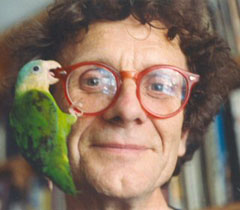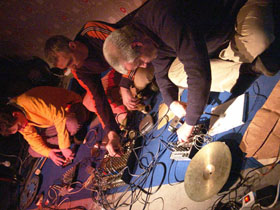Low-Key Sounds In The Low Countries
 |
 |
| William de Ridder | Kapotte Muziekklein with Frans de Waard, photo by Extrapool |
A Brief Intro to 'Unofficial' Dutch Musical Culture
By Thomas Bey William Bailey
(April 2009)
For quite some time now, whenever cultural observers have hoped to demonstrate how radical freedom of expression enriches society (or accelerates its decline), they set their sights on the Netherlands. The perceived liberal and tolerant thrust of Dutch culture (with 'Amsterdam' often substituted erroneously for the nation as whole) has become a constant mantra on the lips of good-time libertarians and utopian dreamers. Conversely, it remains a favorite bête noire of the neo-conservative ideologues who believe that such freedoms are the province of degenerate ingrates who 'owe' their relaxed lifestyle to the 'full spectrum dominance' of U.S. military might- and whatever the case, a hostile takeover by reactionary religious forces will be the ultimate outcome of this societal laxity.
If there's one thing held in common between both sides in this eternal struggle, it's that they regularly fail to uncover more nuanced and innovative Dutch cultural contributions outside of the Cannabis Cup, free public bicycles, and underground sex shops. It would be stretching it to say that mind-blowing Nederhash and other only-in-Amsterdam vices play no role in shaping Dutch popular culture, but it would be even more foolhardy to claim a hard causal relationship between, say, the time one spends languishing in local hash bars and the quality of one's recorded music output. I'd submit the entire career of Vanilla Ice, and his combination of soft-drug enthusiasm with a bottomless bank account, as empirical evidence to the contrary. As is the case with any thriving center of artistic production, an above-average degree of personal freedom means little without above-average personalities to harness it- and the modern Dutch music world, to its benefit, has had no shortage of those.
Resourcefulness and self-sufficiency have been key components in the most successful and acclaimed Dutch musical personalities: from the radical political autonomy of the punk-jazz Ex collective, to improv percussionist Han Bennink's skill for making instruments out of quotidian junk like pizza boxes, there seems to be an innate knack among Dutch musical outsiders and eccentrics for making do with whatever is available (and the myth that most Dutch residents have the money to support professional music careers is another one which should be dispelled immediately). There is still a refreshing disregard for using others' rulebooks to communicate highly personal experience, which has manifested itself not just in the sound, but also in methods of musical distribution, releasing and broadcast. This is especially evident since the early '80's, when a parallel independent infrastructure of 'cassette labels' and pirate transmitter was built up by a few intrepid spirits to accommodate a rising wave of hungry musicians armed with newly affordable recording technology and unorthodox topical material, but no interest from even the few independent labels on hand (the majors, meanwhile, were still struggling to reach a consensus on how to best package and present 'new wave' before its neon light flickered out).
The electronic music label Ding Dong, overseen by the married couple Van Kaye & Ignit, was one early and reliable hub of off-radar Dutch activity, pairing conceptual sophistication with disarming naivete in a way that has been difficult to replicate since the formative years of 'bedroom' electronic music (in a characteristic moment of self-effacement, Van Kaye & Ignit's debut tape boasts that it was recorded on TEAC 4-track 'without noise reduction'). Some of the Legendary Pink Dots' first psychedelically-tinged releases saw the light of day as Ding Dong cassettes, while Ignit's contemporaneous show on national radio provided a chance for spontaneous discovery of the label's music. Another stalwart label of the '80s, Stichting Stopcontact, was light on cassette releases but did provide another route for artists to circumvent the prohibitive cost of LP pressings: its "Contact Disc" series of compilations were a kind of 'pay-to-play' series in which pressing costs were distributed evenly among the international selection of contributors, who were then rewarded with their share of vinyl copies.
Once such individual efforts combined to reach a wider audience, the public 'cassette fair' was not an uncommon sight in Dutch cities by the mid-1980s: a kind of antecedent to the current indie 'craft fair' renaissance. These small expos occasionally doubled as public displays of extravagant cassette packaging: see the 1982 Eksakt Records compilation One Hour For Spits, generously stuffed inside a bath sponge, or the baffling Belgian Assemblée Générale compilations making the rounds at the time, themselves wrapped in things like a fake supermarket steak or a polystyrene pillbox. More importantly, though, these were a nexus for rare performances and equally rare face-to-face contact within a network where mail distribution was still the accepted norm.
As just a quick tour through discogs.com will reveal, the Netherlands were not alone in taking up the mantle of the nascent cassette culture, but they did account for some of its most avid proselytizers. One of these was a young Nijmegen native, Frans de Waard, also a founding member of the oddly organic post-Industrial troupe Kapotte Muziek. De Waard was responsible for De Nederlandse Cassette Catalogus in 1983, a spartan guidebook in a 1,000-copy edition that, according to de Waard "was just a plain list of label names, addresses and their releases- no reviews or biographies" (the Catalogus was later re-published by the official Dutch institute for pop music). Not stopping at this, de Waard also took to his local Nijmegen airwaves to make good on this body of clandestine musical knowledge, with the Dutch airwaves themselves experiencing a boom in broadcasts whose fervor belied their tiny transmission range: from the willfully combative punk antics of Radio Dood ['Radio Death'], to the pirate information resource Rataplan, a wide range of malcontents and alternative types –particularly the not-insignificant squatter communities- were served by this format. In a disappointing turn of developments though, DeWaard claims that the leftist slant of Rataplan did not necessarily imply a friendliness to new sounds, and often there was an outright hostility:
"I had a program [at Rataplan] with experimental music, vinyl and tapes, but the whole radio hated it…unfortunately, the progressive political minds didn't like the real progressive music, just sub-standard alternative rock. Still do, actually. There were other music programs, focusing on, say, hard rock or kosmische music- but we got the shit."De Waard also warns against viewing the local cassette culture, in retrospect, as something to be seen as more diverse than what the reality was: "the majority of the releases... by hometapers, as we called them back then... [were] guys twiddling knobs for an hour on a synthesizer and such like." Regardless, it was the cassette culture which provided a solid bond between restless electro-youth and more seasoned voyagers into the realm of participatory art.
One of said voyagers, Willem de Ridder (who proudly insists that his surname means "to get rid of... your mind"), still towers as an elder statesman of Dutch outsider culture, with a curriculum vitae easily rivaling that of more celebrated multi-media contemporaries. As a member of the Fluxus collective along with luminaries like Nam Jun Paik and Yoko Ono, the illustrious company de Ridder kept may have lessened his chances for wider recognition in the U.S. rather than aiding them, although this hardly lessened the vitality and iconoclasm of his creative output. A summary of his activities from the '60's to the present is well beyond the scope of this article, although some of his more idiosyncratic ventures into audio included music made from crumpled paper wads (or "paper konstellations") and Walkman-aided audio drama 'tours' which transformed one's immediate surroundings into the site of de Ridder's own fantasy scenarios (a ploy which the author unwittingly ended up copying on air in Chicago, in 2004). His participation in the Mood Engineering Society resulted in comically disruptive music hall appearances where de Ridder, after playing a single note on a piano, would be berated and criticized by his audience, and would then sing the collected comments and insults back to them. A personal epiphany for Frans de Waard came via de Ridder's 'Radiola Improvisatie Salon' radio program- broadcast, amazingly, on a national pop station on Friday nights. The show's policy was to play anything it received on cassette without first hearing the contents, a gimmick that connected with both the curiosity of the populace at large, and the hopes of bedroom hometapers from Hertogenbosch to Rotterdam.
DeRidder's unflagging optimism (it's difficult for me to even locate a photo of him sans ear-to-ear grin) seems to have had a galvanizing effect on the culture of independently-produced sound within the Netherlands, particularly when the '80's rolled over into the '90's. You could say that it is because of this good humor and shamanic storytelling ability, rather than in spite of it, that he managed to bridge the gap between the high whimsy of '60's counterculture and the more skeptical, mordant critique of Industrial culture and its offspring. De Ridder had plenty of direct contact with the 'industrialized' sphere of operations, contributing his bewildering, effortless narratives to the psycho-ambient music of the Hafler Trio during their Amsterdam residence, and cleaving close to an intense clique of sound artists that saw very little as being outside of its creative and critical scope. Perhaps what really unites de Ridder with his other more self-sufficient countrymen though is a disdain for the habit of rationalizing one's way out of taking real creative risks, instead opting for the easy way out of being a nihilistic "artist as professional sufferer." The latter, a habit in which de Ridder dismisses as 'voluntary suffering', is one in which
"...you're literally, actively resisting the laws of nature. [...] Once you have your purpose set up, and you know what you really want to do, and you do what you really love to do, then all the other details are automatically arranged for you. The universe takes care of all the details."Simple words like these can be taken as a endorsement of the whole gamut of independent activities– not merely hometaping, or setting up one's own micro-label, but virtually anything which exudes real creativity with no regard to what the zeitgeist may think of it, and with no sense of shame over appearing less than professional.
Also see an excerpt from Frans de Waard's book De Nederlandse Cassette Catalogus